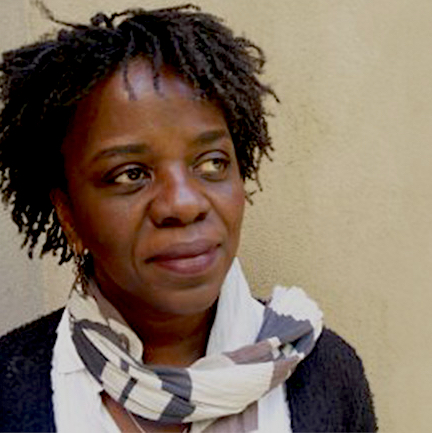Thinking without Time: Theorizing the Racial Event

“Can we think without time?” On February 24, 2022, Denise Ferreira da Silva, professor and director of the Social Justice Institute at the University of British Columbia, posed this question in conversation with Chicano/a and Latin American Studies (CLAS) Chair Natalia Brizuela and Nejat Kedir, a PhD student in African American Studies. While this question may appear to be abstract, for Ferreira da Silva, who asked it just after a talk on “The Racial Event,” it is a way to theorize our understanding of racial histories.
Ferreira da Silva, a pioneer in contemporary Black feminist thought, was the second visiting guest of the CLAS speaker series “New Vocabularies, New Grammars: Imagining Other Worlds.” The series explores the process of critically engaging with interdisciplinarity and reversing the divisions enacted between art, policy, and intellectualism in order to give space to ideologies that flourish in opposition to colonialism and arbitrary ethno-political rhetorics imposed by racialized thinking. Ferreira da Silva spoke on her theory of the Racial Event, a conceptualization of racism’s atemporality that derives from the denaturalization of linear thinking in favor of “thinking without time.”
As Ferreira da Silva puts it, time has everything to do with the colonial infrastructure: time is a measurement of capital, of the property market, of deterministic severability, and of sequentiality. As a result, the very concept of time is constraining, enforcing the infrastructure of thinking. As a descriptive feature, however, time is not inherently necessary, especially because it imposes constrictive logics upon thought processes involving certain events “in time.” In her talk, Ferreira da Silva offered the racial event as one reason to think “without time.” To conceptualize her theory of time and the racial event, Ferreira da Silva triangulated racial dialectic as racial (biological) difference, racist ideas, and racial (social) differences as a methodological tool for reimagining the racial event as untethered by time and circumstance. The rhetoric of chronology in racial thought thus serves to reinforce narratives of racial capitalism that cannot be simplified and detangled by studying events as they are isolated in time and space or considered on separate planes of existence that decontextualize their politicality.
One example of the racial event was previously theorized at the 2016 Liverpool Biennial. Returning to this earlier example at her Berkeley talk, Ferreira da Silva juxtaposed three historical events that each relate to Liverpool, England: one, the 1769 slave rebellion which occurred on the Unity, a ship originating from Liverpool; the 1981 protests that arose in the Liverpool neighborhood Toxteth in response to the arrest of Leroy Alphonse Cooper, a Black resident; and protests that occurred in Liverpool in March 2011 in response to the murder of Mark Dugan, an unarmed Black man, by a police officer in North London. Making conjectures from their similarities, Ferreira da Silva suggested understanding these three incidents not as isolated acts of racial violence, but as interconnected events — indeed, the racial event.
This reading of seemingly distinct events as interrelated derives from a radical approach to time. By denoting seemingly distinct events as direct “causes” or “effects” of one another, Ferreira da Silva argues, one can “hijack” them toward an explanation that alienates them from the context in which they occur. Time itself is not the only issue, then, but “time as it relates to everything else.” But Ferreira da Silva also asks us to unground temporality through the idea of the metaphysical, or the “image of infinity . . . breaking through both the spatial and temporal.” This thinking requires us to step outside of the comforts of the temporal line in order to free our minds from the constraints that limit our ability to render political subjects (let’s imagine an actor at one of three Liverpool-related incidents) politically significant.
Within this framework, Ferreira da Silva pointed to the interconnections of issues at various levels of society across history — ranging from immigration crises across the Mediterranean Sea to the murder of George Floyd, and from the coronavirus pandemic to the Trans-Atlantic slave trade. “It is impossible to think politically without time,” Ferreira da Silva declared, but when we decolonize our understanding of linear temporality we can see that racial subjugation and colonial violence elude chronology: they “resist time,” and it is in this phenomenon that Ferreira da Silva detects the magic of the racial event.